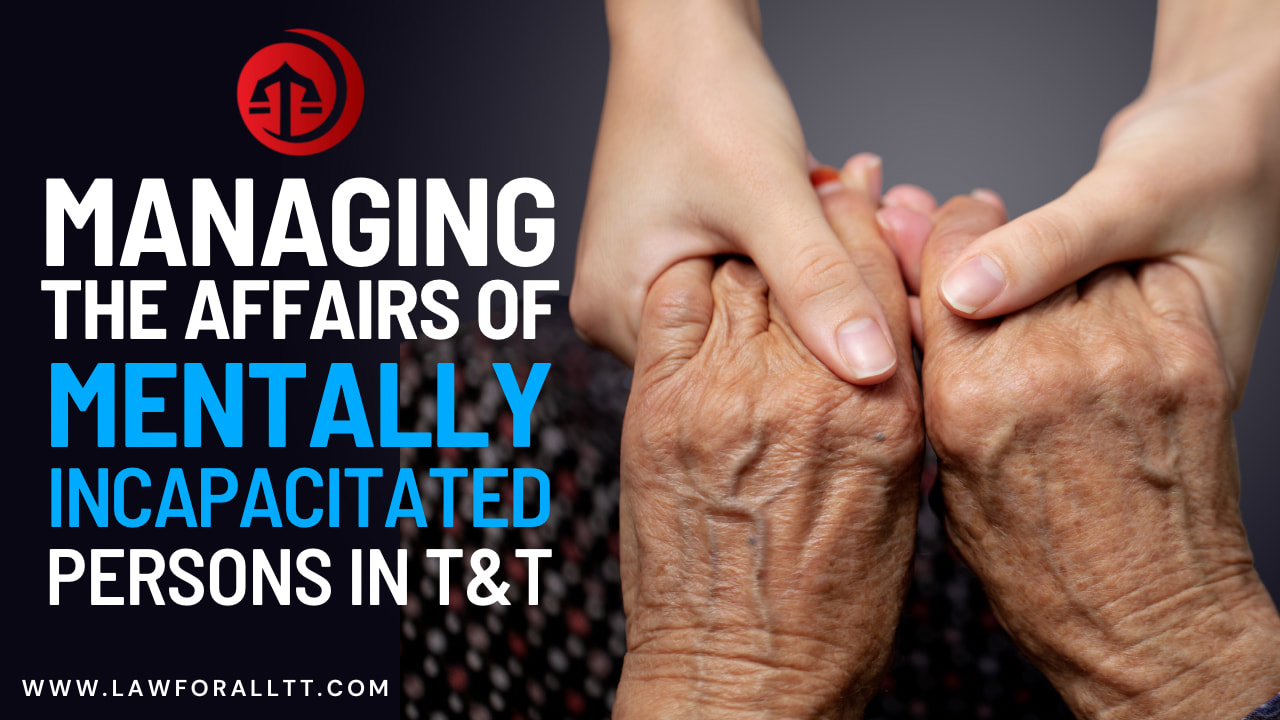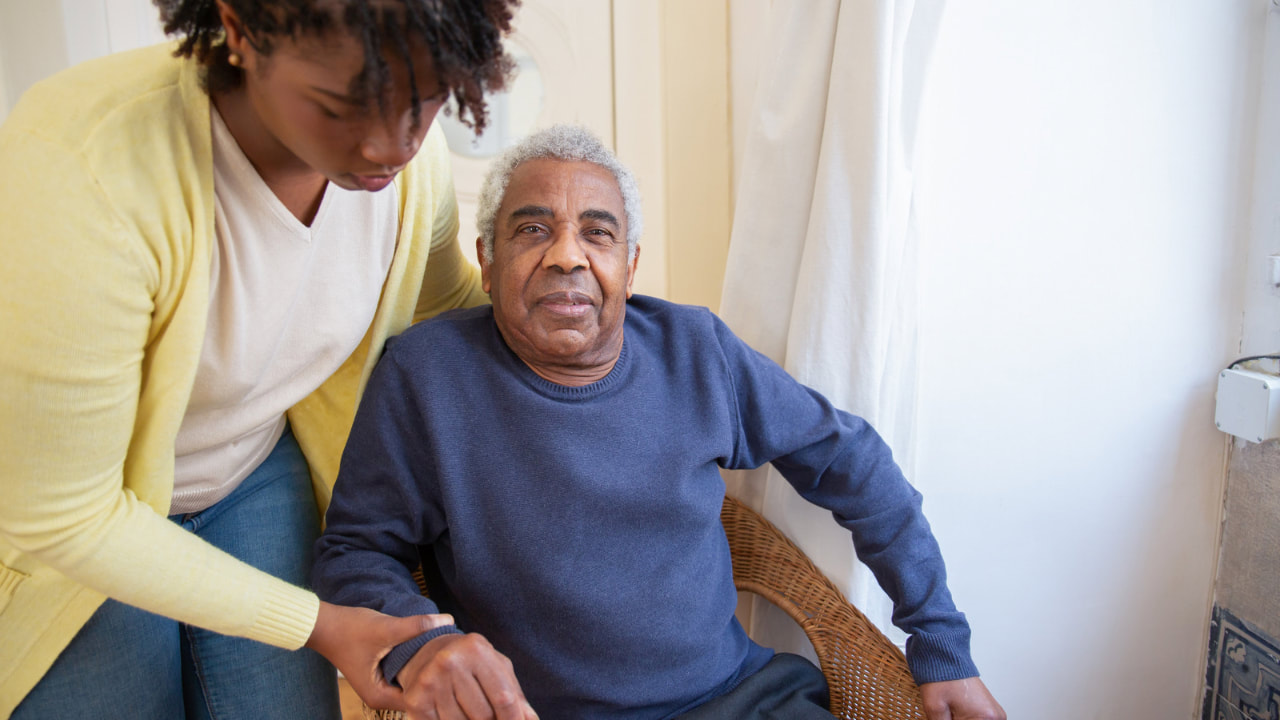|
In Trinidad and Tobago, The Mental Health Act, Chapter 28:02 (hereinafter called "the Act"), provides a legal framework for safeguarding the rights and well-being of individuals who are incapable of managing their personal affairs due to mental incapacity. The Act refers to these individuals as "patients," who are suffering from or are suspected to be suffering from mental illness or who are mentally subnormal. A "mentally ill person" is described under the Act as a person with a mind disorder requiring care, supervision, treatment and/or control for his own own well-being or the well-being of others. While a "mentally subnormal person" is described under the Act as someone whose mind hasn't fully developed due to reasons like inherent causes, disease, or injury before turning eighteen. This includes individuals who need care, supervision, treatment, or control for their own safety or the safety of others.
Among the crucial provisions within the Act is the process for seeking appointment as the Committee of a patient's property, which involves taking control of the patient's affairs. In this article, we will provide a comprehensive guide on how to apply for Committee of a patient's property under the Mental Health Act in Trinidad and Tobago.
Understanding what is a "Committee"
A Committee is an individual or entity appointed by the court to make decisions on behalf of a mentally incapacitated person. Persons considered to be mentally incapacitated would include:
When to consider applying to be appointed committee?
Typically, a person can give another person or entity authority to act on his behalf with a legal document called a “Power of Attorney”. However, for this power of attorney to be legally enforceable, the person granting it must possess the necessary mental capacity. In cases where an individual had previously granted a power of attorney but has since become mentally incapacitated, that existing power of attorney would no longer hold legal validity. In such circumstances, to assume control over the person’s affairs, an application to be appointed as the committee of the person's property becomes necessary.
How to Apply to be the Committee of a Patient's Property
1. Determine Eligibility to Apply It's important to know if one can apply to be the Committee of a Patient's Property. In Trinidad and Tobago, the following individuals or entities can apply:
The application would be prepared by the applicant's attorney. The application is made under section 36 of the Act. It must be supported by an affidavit which states that the patient is incapable, by reason of mental disorder, of managing and administering his property and affairs. The application must include: a. A certificate by the Psychiatric Hospital Director, a duly authorised medical officer or qualified psychiatrist to the effect that the patient is suffering from mental disorder as a result of which he is incapable of managing and administering his property and affairs, and stating the probable duration of the disorder; b. a statement by the Applicant giving a detailed description of the patient’s property and the value of it. c. a statement by the applicant stating-- (i) the name and address of the next of kin of the patient, if any, and (ii) what he proposes to do with the patient’s property during the latter’s illness. 3. File the Application: The completed application with the supporting affidavits and supporting documents is filed by the attorney in the High Court of Trinidad and Tobago. 4. The Interested Parties are served: Once the application is filed, the court will schedule a hearing and all relevant parties with be notified, including the next of kin of the mentally incapacitated person and any other interested parties. This notice provides an opportunity for objections to be raised or concerns to be addressed during the hearing. 5. Attend the Court Hearings: At the scheduled court hearings, the judge will consider all evidence presented. The judge will assess whether appointing the Committee is in the best interest of the mentally incapacitated person.
6. The Court delivers a Decision
Once the judge reviews the application and is satisfied with its merits, he may issue an order appointing the applicant as the committee of the patient's property. What kind of orders can a judge make? The Judge can issue orders considered necessary for the patient's maintenance, benefit, and that of his family, while also making provisions for others that the patient would typically provide for if not suffering from a mental disorder. Additionally, the Judge is empowered to oversee and administer the patient's property and affairs. Specifically, the judge can issue detailed orders and directions concerning the patient's property and affairs, which encompass: - Control and management of the patient's property, which may involve transferring or vesting property. - Authorization of property transactions, such as sale, exchange, charging, or other dispositions. - Facilitating property acquisition on behalf of the patient. - Settlement or gifting of the patient's property for designated individuals or specified purposes. - Authorization of the execution of a Will on behalf of the patient. - Allowing a suitable person to manage the patient's business, if applicable. - Dissolution of partnerships in which the patient is a member. - Execution of contracts entered into by the patient. - Conducting legal proceedings in the patient's name or on their behalf. - Reimbursement of expenses incurred on the patient's behalf, including debt payments or family maintenance. - Exercise of any powers vested in the patient, including powers of consent. However, certain limitations exist: - Settlement of the patient's property is not allowed if the patient is an infant. - Ordering the execution of a Will for the patient is prohibited if the patient is an infant or if the Judge believes the patient is capable of creating a valid Will himself. In summary, the judge's orders are designed to protect the patient's interests, ensure proper management of their property, and provide for their family and other responsibilities. These orders are meticulously tailored to meet the unique needs and circumstances of each patient.
7. Committee Responsibilities:
Once appointed, the committee must act in accordance with the court's orders and make decisions in the best interests of the mentally incapacitated person. The committee has the legal responsibility to manage the person's personal and financial affairs while ensuring their welfare. Important Notice: This post does not constitute legal advice. Always consult with an attorney on any legal problem or issue. This website is managed by AURORA Chambers; a law practice in Trinidad and Tobago. Click HERE to receive updates straight to your inbox by subscribing to our newsletter.
1 Comment
Richard leung
12/6/2024 06:36:55 am
I would like an estimate of the cost for this for my parent
Reply
Leave a Reply. |
Categories
All
Archives
June 2024
|
LawForAllTT.com |
|








 RSS Feed
RSS Feed